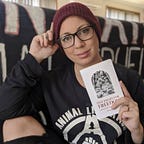Advocating for animals during a pandemic.
We are living in strange times. For most people, the lived experience of quarantining, resources rationing and constant apocalyptic updates is entirely new. In this environment fear spreads as readily as a virus, and pervades our thoughts, our deeds, and our daily actions.
As an animal rights activist, you may be feeling the frustration of not being able to engage in your regular forms of advocacy for non-human animals. Public gatherings to engage in outreach or protests are now no longer safe for ourselves nor the general public. Nor are they as effective as they once were; protests are overshadowed in the media by the pandemic, and there simply aren’t enough people to outreach on the streets. And during a zoonotic pandemic (especially in the case of a novel virus such as SARS-CoV-2), hanging around outside slaughterhouses and saleyards is unlikely to be advisable.
So how can we continue to advocate for non-human animals at such a time? Through embracing mutual aid at a grassroots level within our own communities, and with the effective use of our greatest tool: social media.
Connect with people by sharing vegan resources and recipes. Vegans know how to make a thousand delicious and nutritious meals out of tinned lentils and a few veg. Share your culinary knowledge with those around you. Video a how-to on preparing meals, making bread, tips for baking vegan cakes and treats. Start a vegan recipe sharing group online for friends, neighbours and family. Give people options and information.
Foster an animal for a local rescue or shelter. In times of crisis charitable giving is often the first and hardest hit. If you have the capacity, why not help foster an animal who needs a home? This benefits the animal, the rescue group, and can help prevent social distancing from becoming completely isolating.
Discuss the role that the human relationship with non-human animals has had in creating the environments necessary for zoonotic diseases to speaad to humans from non-human animals, using facts based information. SARS-CoV-2 is one among many diseases that have arisen as a direct result of human exploitation of non-human animals (SARS, MERS, BSE, H1N1 to name a few). Discussions concerning the prevention of future zoonotic pandemics must center the need to transition away from animal exploitation industries, alongside the need for universal healthcare policies and social equality.
Support sanctuaries. Having endured droughts and bushfires, sanctuaries across Australia are facing an entirely new challenge: staying afloat in an economic crisis caused by a pandemic. Donations of food and money are disappearing, food waste donations from supermarkets usually used to feed rescued pigs and poultry are declining, and sanctuary operators who depend on income from their jobs to fund operations are now facing catastrophic income loss as workplaces shut down. Sponsor an animal, donate a bale of hay, donate any loose change you might have, share the stories of the sanctuary residents on social media. Freeze veggie offcuts and bread ends for pig and poultry feed (check with the sanctuary first for their safe foods list). And contact political representatives to request that animal sanctuaries be considered under economic rescue packages.
Combat racism and speciesism when discussing the pandemic. Sinophobia is a serious issue amongst the broader community, and the animal rights community does not exist in a vacuum. Wishing harm upon all Chinese people, engaging in racist stereotyping, and sharing inaccurate misinformation over resources hoarding incites violence against innocent people. So too does the language we use when discussing the origins of SARS-CoV-2 amongst non-human species. Misinformation about where it originated and how it can be spread can lead to the demonisation of certain species thus leading to their persecution. SARS-CoV-2 is a virus born not of the people of China nor of certain animals, but rather from the relationship of dominance humans engage in with non-human animals.
Join or create mutual aid networks in your area helping the vulnerable and connecting you with like minded individuals who are also interested in the ideals of fairness and justice. We do not live single-issue lives, and thus our advocacy is better informed when working within the spheres of other social justice issues. The connections we make today will be invaluable in creating new and essential forms of social justice advocacy in the post-SARS-CoV-2 world.
Above all, treat others with the compassion and kindness you wish to see in the world. As political leadership fails to consider individual needs over the economy, as increasingly militarised laws are enacted controlling our movements within communities, now more than ever has it become necessary to support the person standing next to you.
We have a unique opportunity to reset society and create new systems of justice and fairness for all; but we cannot achieve this without a willingness to work, to fight, and to love together.
